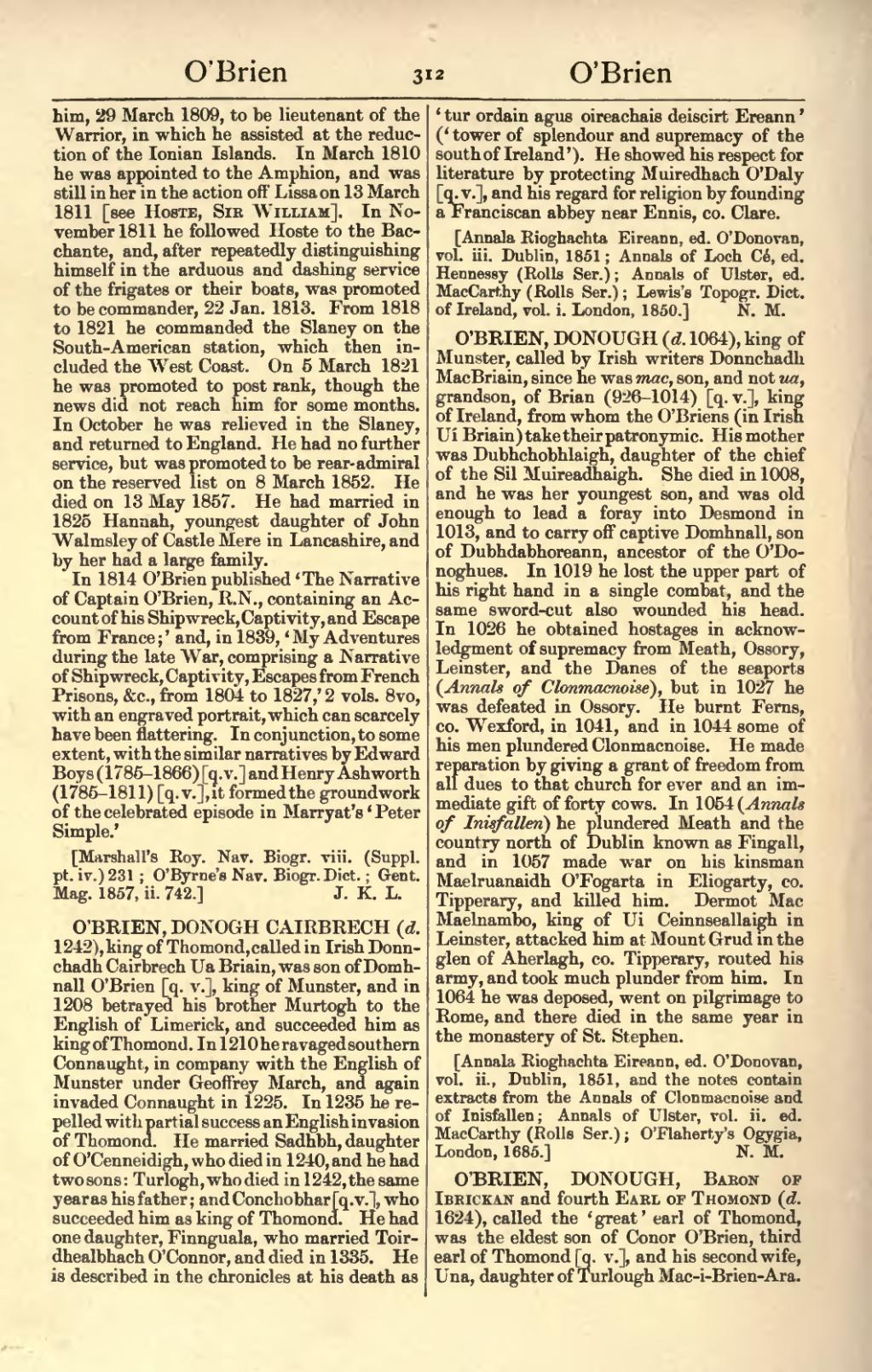him, 29 March 1809, to be lieutenant of the Warrior, in which he assisted at the reduction of the Ionian Islands. In March 1810 he was appointed to the Amphion, and was still in her in the action off Lissa on 13 March 1811 [see Hoste, Sir William]. In November 1811 he followed Hoste to the Bacchante, and, after repeatedly distinguishing himself in the arduous and dashing service of the frigates or their boats, was promoted to be commander, 22 Jan. 1813. From 1818 to 1821 he commanded the Slaney on the South-American station, which then included the West Coast. On 5 March 1821 he was promoted to post rank, though the news did not reach him for some months. In October he was relieved in the Slaney, and returned to England. He had no further service, but was promoted to be rear-admiral on the reserved list on 8 March 1852. He died on 13 May 1857. He had married in 1825 Hannah, youngest daughter of John Walmsley of Castle Mere in Lancashire, and by her had a large family.
In 1814 O'Brien published ‘The Narrative of Captain O'Brien, R.N., containing an Account of his Shipwreck, Captivity, and Escape from France;’ and, in 1839, ‘My Adventures during the late War, comprising a Narrative of Shipwreck, Captivity, Escapes from French Prisons, &c., from 1804 to 1827,’ 2 vols. 8vo, with an engraved portrait, which can scarcely have been flattering. In conjunction, to some extent, with the similar narratives by Edward Boys (1785–1866) [q. v.] and Henry Ashworth (1785–1811) [q. v.], it formed the groundwork of the celebrated episode in Marryat's ‘Peter Simple.’
[Marshall's Roy. Nav. Biogr. viii. (Suppl. pt. iv.) 231; O'Byrne's Nav. Biogr. Dict.; Gent. Mag. 1857, ii. 742.]
O'BRIEN, DONOGH CAIRBRECH (d. 1242), king of Thomond, called in Irish Donnchadh Cairbrech Ua Briain, was son of Domhnall O'Brien [q. v.], king of Munster, and in 1208 betrayed his brother Murtogh to the English of Limerick, and succeeded him as king of Thomond. In 1210 he ravaged southern Connaught, together with the English of Munster under Geoffrey de Marisco [q. v.], and again invaded Connaught in 1225. In 1235 he repelled with partial success an English invasion of Thomond. He married Sadhbh, daughter of O'Cenneidigh, who died in 1240, and he had two sons: Turlogh, who died in 1242, the same year as his father; and Conchobhar [q. v.], who succeeded him as king of Thomond. He had one daughter, Finnguala, who married Toirdhealbhach O'Connor, and died in 1335. He is described in the chronicles at his death as ‘tur ordain agus oireachais deiscirt Ereann’ (‘tower of splendour and supremacy of the south of Ireland’). He showed his respect for literature by protecting Muiredhach O'Daly [q. v.], and his regard for religion by founding a Franciscan abbey near Ennis, co. Clare.
[Annala Rioghachta Eireann, ed. O'Donovan, vol. iii. Dublin, 1851; Annals of Loch Cé, ed. Hennessy (Rolls Ser.); Annals of Ulster, ed. MacCarthy (Rolls Ser.); Lewis's Topogr. Dict. of Ireland, vol. i. London, 1850.]
O'BRIEN, DONOUGH (d. 1064), king of Munster, called by Irish writers Donnchadh MacBriain, since he was mac, son, and not ua, grandson, of Brian (926–1014) [q. v.], king of Ireland, from whom the O'Briens (in Irish Uí Briain) take their patronymic. His mother was Dubhchobhlaigh, daughter of the chief of the Sil Muireadhaigh. She died in 1008, and he was her youngest son, and was old enough to lead a foray into Desmond in 1013, and to carry off captive Domhnall, son of Dubhdabhoreann, ancestor of the O'Donoghues. In 1019 he lost the upper part of his right hand in a single combat, and the same sword-cut also wounded his head. In 1026 he obtained hostages in acknowledgment of supremacy from Meath, Ossory, Leinster, and the Danes of the seaports (Annals of Clonmacnoise), but in 1027 he was defeated in Ossory. He burnt Ferns, co. Wexford, in 1041, and in 1044 some of his men plundered Clonmacnoise. He made reparation by giving a grant of freedom from all dues to that church for ever and an immediate gift of forty cows. In 1054 (Annals of Inisfallen) he plundered Meath and the country north of Dublin known as Fingall, and in 1057 made war on his kinsman Maelruanaidh O'Fogarta in Eliogarty, co. Tipperary, and killed him. Dermot Mac Maelnambo, king of Ui Ceinnseallaigh in Leinster, attacked him at Mount Grud in the glen of Aherlagh, co. Tipperary, routed his army, and took much plunder from him. In 1064 he was deposed, went on pilgrimage to Rome, and there died in the same year in the monastery of St. Stephen.
[Annala Rioghachta Eireann, ed. O'Donovan, vol. ii., Dublin, 1851, and the notes contain extracts from the Annals of Clonmacnoise and of Inisfallen; Annals of Ulster, vol. ii. ed. MacCarthy (Rolls Ser.); O'Flaherty's Ogygia, London, 1685.]
O'BRIEN, DONOUGH, Baron of Ibrickan and fourth Earl of Thomond (d. 1624), called the 'great' earl of Thomond, was the eldest son of Conor O'Brien, third earl of Thomond [q. v.], and his second wife, Una, daughter of Turlough Mac-i-Brien-Ara.

